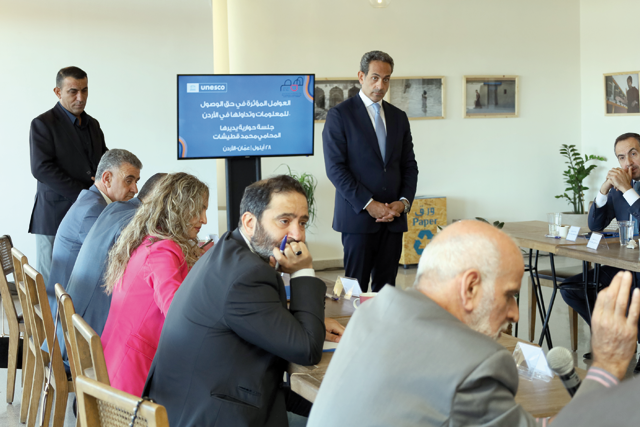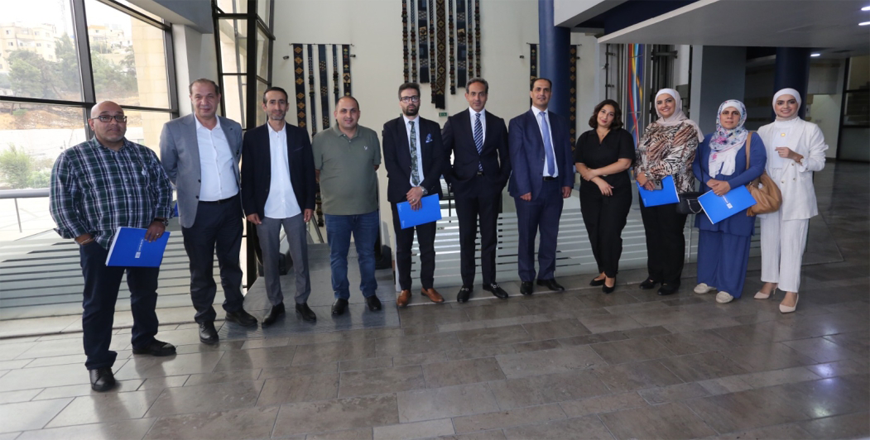You are here
Judicial Institute of Jordan, UNESCO hold roundtable on access to information
By JT - Sep 28,2021 - Last updated at Sep 28,2021
AMMAN — Judicial officers, journalists, civil society activists, parliamentarians, lawyers and access to information regulatory bodies joined forces with UNESCO to issue a strong call for greater access to free, reliable and independent information, according to a statement from the UN agency.
The call came during a roundtable organised by UNESCO in collaboration with the Judicial Institute of Jordan on Tuesday to mark International Day for Universal Access to Information (IDUAI).
The roundtable, “The role of judicial operators in the protection and promotion of the right of access to information” brought leading experts on access to information legislation together to highlight the role of judicial operators in ensuring a safe environment for journalists, and in providing good governance and more transparency through improving access to public information, the statement said.
In delivering the opening remarks at the event, Director General of the Judicial Institute Judge Nawal Al Jawhari said: “This experience with UNESCO is an important milestone in the ongoing task of training of judges in Jordan and this continued cooperation resulted in developing a training toolkit on freedom of expression, which tackles the right to information”.
UNESCO Representative in Jordan Min Jeong Kim said that this year’s theme “Building Back Better with Access to Information” for the international day is based on the recognition that well-crafted access to information legislation and its rigorous implementation promotes sustainable development as well as democracy and human rights.
She stressed the importance of the role of the judiciary in guaranteeing the rights to freedom of expression and access to public information, in accordance with national law and international instruments.
UNESCO Director General Audrey Azoulay urged all countries to adopt legislation in the field of access to information, and to strengthen the implementation of such guarantees where these already exist such as the case of Jordan.
She emphasised that “governments must ensure safe and transparent data collection, strengthen record keeping and enable accurate analysis. They must align these efforts with international privacy standards”.
Executive Director of Centre for Law and Democracy Toby Mendel pointed out the key function that judiciary can play in safeguarding against the erosion of the right and ensuring that states and other relevant actors meet their obligations to respect, protect, promote, and fulfil the right to freedom of expression.
Khalid Khlaifat, legal adviser specialised in defending journalists and freedom of expression, spoke of the many challenges that the effective implementation of the ATI Law faces. These include no clear mechanism for the classification of information, a wide range of excluded documents, lack of or weak human resources and the impunity that accompanies the non-publication of information.
Rawan Al Damen, general director of Arab Reporters for Investigative Journalism (ARIJ), said that access to information is crucial to the work of journalists, especially those working on investigative stories.
She criticised the failure to make timely, updated information available and reports of restrictions on accessing the Internet, blocked social media platforms and other communication services.
The panel discussion, moderated by Judge Raba’ Al Kylani and Judge Ahmed Al Faouri, tackled many issues including the role of the judiciary in promoting the right to information, the gender dimension of access to information and the inequality gaps and challenges in covering COVID-19 and policy guarantees for access to information implementation in time of crisis.
Walid Hosni, journalist and researcher in Media Freedoms, noted with concern that journalists and media workers are subjected to significant physical and psychological risk by being at the frontline reporting on the COVID-19 crisis. They are working under extremely challenging conditions, partly because of a lack of sanitary precautions and training, but also because of psychological stress linked to the rapidly evolving situation, according to the statement.
He added that declarations of state of emergency due to the COVID-19 pandemic should not be used as a basis to limit freedom of expression and constrain the working environment of journalists and media workers.
For his part, UN Resident and Humanitarian Coordinator in Jordan Anders Pedersen said: “During the pandemic we noticed the growing restrictions globally on freedom of expression and of the press”. He added: “If we want to build forward better, this could be the opportunity to regain public trusts and freedoms and allow more space for the public freedom of expression and promote their access to information”.
Nahla Al Momani, from the Jordan’s National Centre for Human Rights said: “There is still a lot of progress to be made, notably regarding improving the law and its actual implementation. Moreover, there is a considerable lack of awareness among the public, as well as government bodies, regarding the use of the fundamental right of access to public information”.
To take action from this roundtable discussion and to effectively promote the right to access to information, UNESCO has joined hands with the Judicial Institute of Jordan to organise training for judges from Jordan to enhance their capacities and knowledge on issues related to freedom of expression and access to information.
The first four-day training course is scheduled to coincide with the International Day for Universal Access to Information for a target of 17 judges. This action is supported by the Multi-Donor Programme on Freedom of Expression and Safety of Journalists.
Related Articles
AMMAN — UNESCO Jordan and HIMAM (The Coalition of Jordanian Human Rights Civil Society Organisations) on Wednesday organised a roundta
AMMAN — Commemorating the International Day for Universal Access to Information (IDUAI), UNESCO Jordan and the Greater Amman Municipality (G
AMMAN — Building upon the judges’ retreat that brought together Jordanian and French judges in August 2017, UNESCO has conducted its latest















